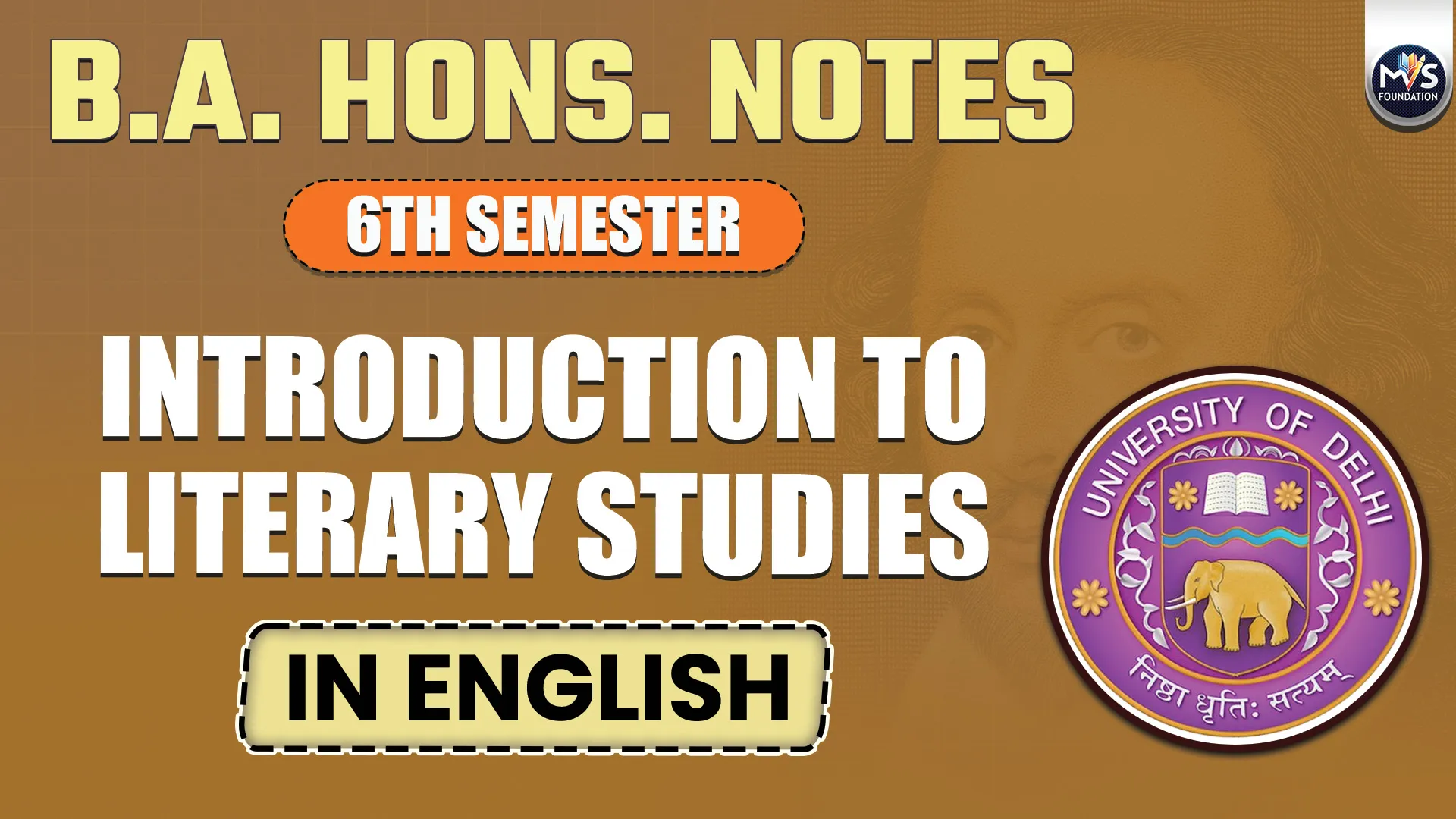Q1. "It is a truth universally acknowledged, that a single man in possession of a good fortune, must be in want of a wife". Based on the opening line from Jane Austen's Pride and Prejudice, write a short note on the use of irony as a narrative device.
Answer -
Introduction
Pride and Prejudice written by Jane Austen and published in 1813. This novel is one of her earliest novels and beloved by readers worldwide. Though her later works, like Emma and Persuasion, show her artistic growth, Pride and Prejudice already reflects austen's mature style. Set in the late 18th century english countryside, the novel humorously explores the lives, values and social behaviours of the middle class.
Click Here For Full Notes
|
DID YOU KNOW?
Pride and Prejudice published in 1813 but first draft was written as early as 1796. In novel Austen masterfully portrays her characters flaws and qualities through witty, realistic dialogue making it a delightful comedy of manners.
|
About The Author
Jane Austen was born on December 16, 1775 in steventon, where her father served as rector. She was the youngest of seven children, living a calm and uneventful life marked only by occasional visit to the theatre or the cities of bath and london. Known for her tall, slender appearance, hazel eyes and keen humor, Austen was private and reserved, Focusing on the details of everyday life. She wrote six novels, including Pride and Prejudice and Emma, known for their subtle humor, realistic characters, and simple plots. Austen passed away in 1817, leaving a legacy as one of England's finest novelists.
"It is a truth universally acknowledged, that a single man in possession of a good fortune, must be in want of a wife".
Irony as a Narrative Device in the Opening Line of Pride and Prejudice
1. Understanding Irony
Irony: Irony is when there is a difference between what appears to be true and what actually is true. It can happen in different ways. verbal irony, situational irony, and dramatic irony. Verbal irony is when someone says something but means the opposite. Situational irony occurs when what happens is very different from what we expect. Dramatic irony is when the audience knows something that the characters do not. In Jane Austen's Pride and Prejudice, she uses verbal irony a lot, often to criticize the social rules and expectations of her time.
Click Here For Full Notes
2. Irony as a Critique of Social Norms
- The first line of Pride and Prejudice introduces the theme of marriage in society. In the world Austen shows, marriage is more about money, status, and security than love or compatibility. The notion that a wealthy, single man must be "in want of a wife" is presented a simple truth. However, this way of saying it is ironic because it suggests that the man's desire for a wife is not based on love or personal feelings, but instead on what society expects from him.
- The irony lies in the fact that the characters, especially the Bennet family, mistakenly assume that wealthy men must be in search of a wife, when in fact, Mr. Darcy, who is wealthy, initially shows no interest in marriage. Through this line, Jane Austen mocks the social expectations of the time, where marriage and wealth are seen as inseparable. The irony deepens as the story progresses and Mr. Darcy, though wealthy, develops a strong emotional connection with Elizabeth Bennet, whose social status does not align with the initial assumption. This subverts the conventional belief that wealth dictates marriage choices. The irony is both humorous and critical of societal attitudes, showcasing Austen's sharp wit and critique of class dynamics.
3. Mr. Darcy's Pride and Elizabeth's Prejudice
- In Pride and Prejudice, irony plays an important role in the development of Mr. Darcy and Elizabeth Bennet's relationship. At first, Mr. Darcy's pride and Elizabeth's prejudice create major obstacles for them. Darcy is seen as proud and distant, but over time, we learn he is capable of love and humility.
- Elizabeth, who thinks she is good at judging people, ironically misunderstands him for most of the story. This is clear when Elizabeth rejects Darcy's first proposal because she believes he is selfish. But after reading his letter, she learns the truth about his actions and understands how his pride kept him from expressing his love earlier. This realization makes her see how she was prejudiced against him. The irony in this part of the story shows that the characters' flaws don't define them forever. It also teaches that real understanding comes with self-reflection and growth.
4. The Irony of Mr. Collins' Proposal to Elizabeth
- In the novel, the scene where Mr. Collins proposes to Elizabeth is very ironic. Mr. Collins, a proud and overly polite clergyman (Priests), proposes to Elizabeth because he feels it is his duty, not because he loves her. He assumes she will accept his proposal because the Bennet family needs a secure inheritance.
- The irony comes from his complete misunderstanding of Elizabeth's feelings. He thinks she will be happy with his offer, but he fails to recognize that she doesn't want to marry him. His refusal to take her rejection seriously shows that he doesn't understand love or personal feelings. On the other hand, Elizabeth's rejection is also ironic because she sees marriage as a meaningful connection based on love, while Mr. Collins only sees it as a social obligation.
Click Here For Full Notes
5. The Irony of Lydia's Elopement with Wickham
- Lydia Bennet's elopement with George Wickham is an important example of irony in the novel. Lydia, the youngest and most careless of the Bennet sisters, runs away with Wickham, a man she has no real feelings for. She does this because she wants excitement and adventure. The irony is that despite Lydia being Careless and naive, she ends up marrying Wirkham, a man who had already caused trouble for her family.
- This is very different from her older sisters, like Jane and Elizabeth, who are more sensible and controlled but face many difficulties in finding a good marriage. Lydia's actions cause a social scandal, and when Mr. Darcy steps in to help her marry Wickham, it highlights the hypocrisy in society's views on morality and marriage. While Lydia is seen as doing something wrong, Darcy's involvement makes us question how much importance is placed on social status and reputation. The irony in Lydia's marriage also critiques how love is often linked to wealth and reputation, instead of true happiness.
6. The Irony of Lady Catherine de Bourgh's Interference
- Lady Catherine de Bourgh, is a memorable character in Austen's novel, known for her sense of superiority due to her wealth and aristocratic status. She believes that her high position gives her the right to control others. One example of this is when she tries to stop Elizabeth and Darcy from marrying. She goes to Elizabeth and demands that she reject Darcy's proposal, thinking that her status will force Elizabeth to obey.
- However, this is ironic because Darcy's feelings for Elizabeth have already grown stronger than Lady Catherine's control over him. Instead of making Darcy change his mind, Lady Catherine's actions only make him more determined to marry Elizabeth. Her belief that she is protecting Darcy from a marriage with someone "below" his social class is also ironic, as she does not understand Darcy's true feelings or see how much Elizabeth is worth beyond her social rank. Through Lady Catherine's character, Austen mocks the idea that love and happiness depend on social status, showing that real love comes from respect and understanding, not aristocratic expectations.
Conclusion
Jane Austen's use of irony in Pride and Prejudice critiques marriage, class, and character judgments. It highlights the complexities of human relationships and offers social commentary. The novel's ironies reveal deeper truths about pride, prejudice, and personal growth, making it both entertaining and thought-provoking. This blend of humor and reflection contributes to its timeless appeal.
Click Here For Full Notes

